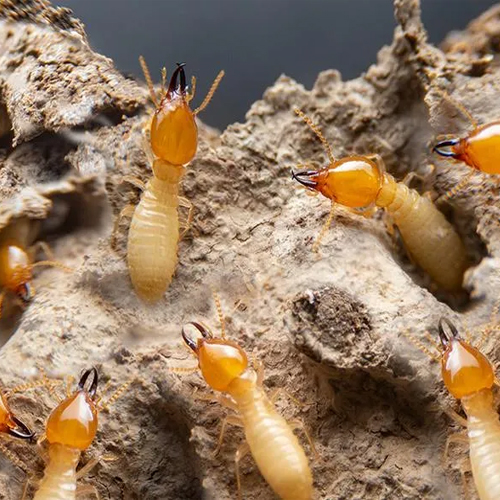1. Types of Termites:
- There are several termite species, but the most common types that infest homes and structures are subterranean termites, drywood termites, and dampwood termites.
2. Signs of Termite Infestation:
- Detecting termites early is crucial. Signs of a termite infestation may include:
- Mud tubes or tunnels on walls and foundation.
- Discarded wings near windowsills and light sources.
- Hollow or damaged wood that sounds dull when tapped.
- Small piles of fecal pellets (frass) near termite galleries.
- Swarming termites, especially during the spring and fall.
3. Professional Inspection:
- If you suspect a termite infestation, it's advisable to hire a licensed pest control professional for a thorough inspection. They have the knowledge and tools to detect termites and assess the extent of the infestation.
4. Treatment Options:
- Termite treatment options vary depending on the type of termite and the severity of the infestation. Common treatment methods include:
- Chemical Treatments: The application of liquid termiticides or bait stations to create a protective barrier or attract and eliminate termites.
- Heat Treatment: Raising the temperature within infested wood to kill termites.
- Fumigation: Tenting the entire structure and fumigating it with gas to eliminate termites.
5. Prevention:
- To prevent termite infestations or future recurrence, consider the following preventive measures:
- Maintain proper ventilation and reduce moisture in crawl spaces and basements.
- Keep wood and debris away from the foundation of your home.
- Ensure wooden structures, such as decks and fences, are properly maintained and not in direct contact with the soil.
- Regularly inspect and maintain wooden components of your home, such as eaves, fascia, and siding.
- Install physical barriers like metal mesh screens to prevent termites from entering the structure.
6. Regular Inspections:
- Schedule regular termite inspections, especially if you live in an area prone to termite activity. Early detection can help prevent extensive damage.
7. Professional Expertise:
- Dealing with a termite infestation is best left to pest control professionals. They can determine the most appropriate treatment plan based on the type of termite and the severity of the infestation.
8. Legal and Regulatory Compliance:
- Pest control professionals must follow local, state, and federal regulations regarding termite treatment and pesticide use.


